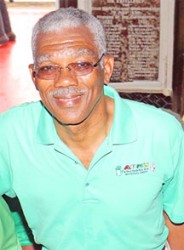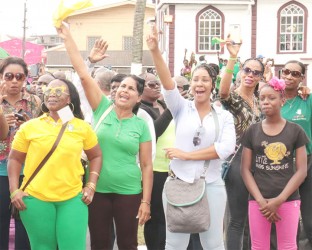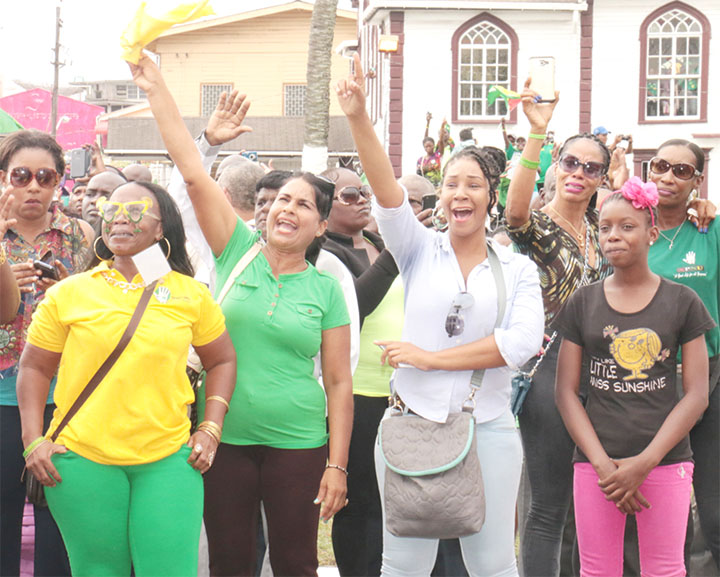More out of hope than expectation I had decided that I wanted to be among the front runners for an interview with President David Granger. Long before he was sworn in, long before polling day even, I had thought of trying to extract a prior promise from him that I would get my wish. I shelved the idea after it occurred to me that it may have been ludicrous to seek such a commitment even as he was preoccupied with trying to win what seemed likely to be a close contest. My wish, I reasoned, was even more absurd than putting the cart before the horse; it was like decoupling the two altogether.

The thought of trying to get the interview returned to me on the evening after the swearing in. I had not gone to the ceremony. The mental exertions of waiting for former president Donald Ramotar to concede defeat had left me with no appetite for the occasion. It had to do mostly with the frustration of having to live through,
for the umpteenth time, the strains and stresses arising out of waiting for the results of a general election to become final and for the winner to take possession of the spoils without the sorts of upheavals that have now become an occupational hazard of being part of the process. May 11 and what followed served as a poignant reminder that accepting the will of the people is a nettle which our political leaders have, over the years, had considerable difficulty in grasping.
I tried the President’s residential telephone knowing only too well that I would get no answer. I had made several previous attempts to speak with him by telephone on previous days. The problem, I had eventually worked out, was that his phone had been deliberately removed from service to stave off the sheer number of attempts that were bound to have been made to reach him. I reasoned too that on the evening after he had been sworn in as President of the entire swathe of 83,000 square miles of our country and in the immediate wake of a tense period arising out of the protestations of the PPP that had delayed the declaration of the final result and the swearing in, I would have considerable difficulty locating President Granger and that even if he could be found he was almost certain not to want to spend time with a journalist at that particular moment.
I persisted purely on account of my knowledge that over the years, our association had come to be underpinned by a generous measure of mutual respect and cordiality and that if I could find him he might not turn me away.
I set out from my home to find President Granger long after darkness had fallen on Saturday and, frankly, without any idea as to where he might be found and even if, perchance, I could find where he was, whether what would certainly be his altered personal security arrangements would allow me access without having made a prior request for an audience with him. I dismissed that line of reasoning on the grounds that I had already gone to too much trouble to undertake the mission to abandon it without even trying.
I decided to try his home obliquely opposite the National Cultural Centre because I couldn’t think of any place else to start but pretty certain that he would not be there.
The guard on duty was an amiable uniformed supernumerary constable who did not have the appearance of a presidential bodyguard. I gave my name, asked if the President was at home and whether I might see him and was told to wait. Within a minute the guard returned and completely surprised me by beckoning me inside.
I had gone to President Granger’s home before. The yard had a familiar appearance of un-fussiness about it. What was new was that there was a car parked on the premises which had had its licence plate removed and replaced by the Presidential Arms.
‘Mr President’
Even as I was squeezing myself inside the partially open gate the President appeared in a doorway clad in what had become, for some time, his regulation green APNU polo shirt, dark shorts and a pair of what looked like rubber slippers on his feet. He greeted me casually, as though there had been no general elections, no change of government and as though I was not in the presence of the leader of the country. Moreover, he seemed unmindful of my own awkward efforts to accord him a “Mr President” salutation, the inappropriateness of the circumstance notwithstanding.

I was shocked that I had found him this easily. More than that I felt an acute sense of unease upon realizing that I was intruding on the country’s Chief Executive on a day that was likely to have been one of the more significant, more emotional and more demanding days of his life, without tendering even as much as a prior request for an audience.
He beckoned me inside the house where I was half expecting to see a retinue of newly appointed or at least nearly appointed officials ‘revving up’ the engine of the new administration, or, at worst, unwinding with a drink. Not a soul else was in sight!
President Granger had the look of a man who was taking a fleeting period of ‘time out’ from reflecting on the magnitude of the mission that the coalition which he had led had accomplished. Inside his modest living room there was nothing remotely resembling officialdom. The appearance of the room made me temporarily forget the purpose of my own mission. He asked about my day and about the Stabroek News. The latter enquiry served as a reminder of the reason for my being there.
Without warning the President began to talk – about the rigours of the campaign trail, the support that the coalition campaign had received from people across the country and the significance of the victory for the coalition. I decided then that once I sat and mostly listened to him exhale I could get what I wanted without even having to ask for it.
It is not difficult to get the impression that President Granger possesses a considerable confidence in women and a monumental respect for them. He wanted me to know of his belief in their political loyalty, their proclivity for being protective, the magnitude of the contribution that they continue to make to the country and their fulsome entitlement to a generous share of whatever his government had to offer the people of Guyana. I wanted to interrupt but he insisted on telling me a story of a small group of Amerindian women who had attached themselves to him during one of his campaign trips to the interior. Those trips, he believed, were politically significant. He wanted, he said, to take a campaign style to interior communities that transcended superficiality and went beyond simply making promises. Amerindian communities, he told me, had to be seen as more than appendages to be remembered only for their votes which they gave to political parties.
After the presentation on Amerindians, I thought I might venture an enquiry on the likely composition of the Cabinet. In response, he proffered a brief reminder on the constitutional procedures associated with appointing parliamentarians and cabinet ministers and went no further. I surmised his brief response to be another way of saying that matters of the nation rather than matters of state were about as much as I would get out of him that evening.
Duty
Since I was not about to risk offending this nation’s Chief Executive whose private space I had invaded on the evening of the day on which he had been sworn in, I decided that I was faced with a choice of either allowing him to dictate the agenda for our discourse or else, run the risk of him cutting short my visit, perhaps on the altogether justifiable grounds that he was tired. I choose the only wise option that I thought I had.
With hindsight I concede that the themes that he selected for our discourse were infinitely more interesting than mine. As a journalist I had wanted, as far as I could, to get ‘in the know’ – so to speak- about who would be this or that minister and how the political spoils would be shared amongst all of those political parties comprising the coalition. Those are the juicy bits of information that people want to know and which are deemed by media houses to be newsworthy. President Granger did not beg to differ, he insisted on differing.
He felt that it was more important that we talk about how the coalition intended to reciprocate the nation’s vote of confidence than for me to make off from D’Urban Backlands with some scoop on Cabinet appointments, the newsworthiness of which would not survive beyond the next day.
I gleaned the distinct impression that President Granger had already begun to assess the weight of his administration’s responsibility against its capacity to deliver. The greatest burden appears to lie in what he believes to be the new government’s duty to pay back the people for the confidence that they reposed in it on May 11.
For him, the awesomeness of the responsibility is a function of what he sees as a duty from which his government simply cannot shirk. He sees some of his more pressing tasks in the mundanities like building roads and bridges and schools and technical institutes and creating jobs and improving health facilities and on the whole, making meaningful changes in the lives of people.
If, sometimes, I caught glimpses of anxiety over the sheer weight of the responsibility that his government faces, I believe that he wanted me to know that, for him, failure is not an option.
If there are doubts, those, it seems, repose in his understanding of the human condition – like the inevitability of ageing and of arriving at a point where the body no longer responds as generously to the dictates of the mind. I found that he reminded me just a little too often that he was close to 70. Not that those reminders were attended by any hint of either prevarication or uncertainty. It would not surprise me if becoming President has gifted David Granger with a generous dose of realism. He understands too that he must manage a political formula that has no precedent. With the very best of intentions it could have its stresses and strains. On a table in his living room close to where we sat lay a copy of the Cummingsburg Accord, a critical coalition governance instrument.
Even the Cummingsburg Accord he says, has to be subsumed beneath other unprinted instruments of governance, like trust and goodwill and a sense amongst the coalition partners of the weighty collective responsibility with which the nation has entrusted them. If those virtues remain intact, he says, if the political parties who now share office embrace the spirit of the Cummingsburg Accord then there is no reason to fear a departure from the letter of the document.
Healing
He would have preferred a changing of the guard that had been attended by a measure of amicability and more particularly by gestures of magnanimity from his predecessors. He believes that it would have signalled much more than the symbolic turning of a political corner. In its absence, however, he was not despairing about the prospects for healing the wounds that the past few months – and more particularly the past few days – had opened.
Throughout our time together I kept searching for the signs of elation, perhaps satisfaction which I thought ought to attend being sworn in as the country’s Executive President. I do not think that I saw any of that. Instead, it seemed that the country’s new President had become stricken with an overwhelming sense of the sheer weight of his new undertaking. We talked, briefly, about that time in his life when he served as Commander of the Guyana Defence Force. I ventured that his contemporary responsibilities were far weightier and he responded with a stare that suggested that I was not making a particularly novel observation. Still, he felt that there were lessons that he had learnt from his earlier experiences of leadership that would serve him well in his current, far more demanding ‘incarnation.’
I felt that before I left his home I should ask about his ‘overarching vision’ for the future of Guyana, then it occurred to me that he had already shared that with me. All he wanted, he said was to try to better the lives of people, incrementally, in ways that imbued them with a sense of going forward.
He seemed to be reaching for a way of assembling the promises which the coalition had made to the electorate into some sort of manageable package and lending his own personal attention to ensuring that those promises bore fruit. Frankly, I left his home on Saturday evening pondering what has seemed to me to be the gap between his stated good intentions and the enormity of the undertaking.
Power can be a demanding thing to manage. President Granger, it seemed to me, was in the process of incrementally seeking to refine the paradigms of his personal mission as President. He never once referred to his commitment to the coalition without reaching for the file in which he kept a copy of the Cummingsburg Accord and referring to some section thereof to underscore a point that he was seeking to make to me.
Not once, however, did he seek to place so much weight on the significance of the Accord as to cause it to seem as though it was greater in its significance than what he believed was a moral commitment to deliver a worthwhile response to the nation now that it has spoken.

